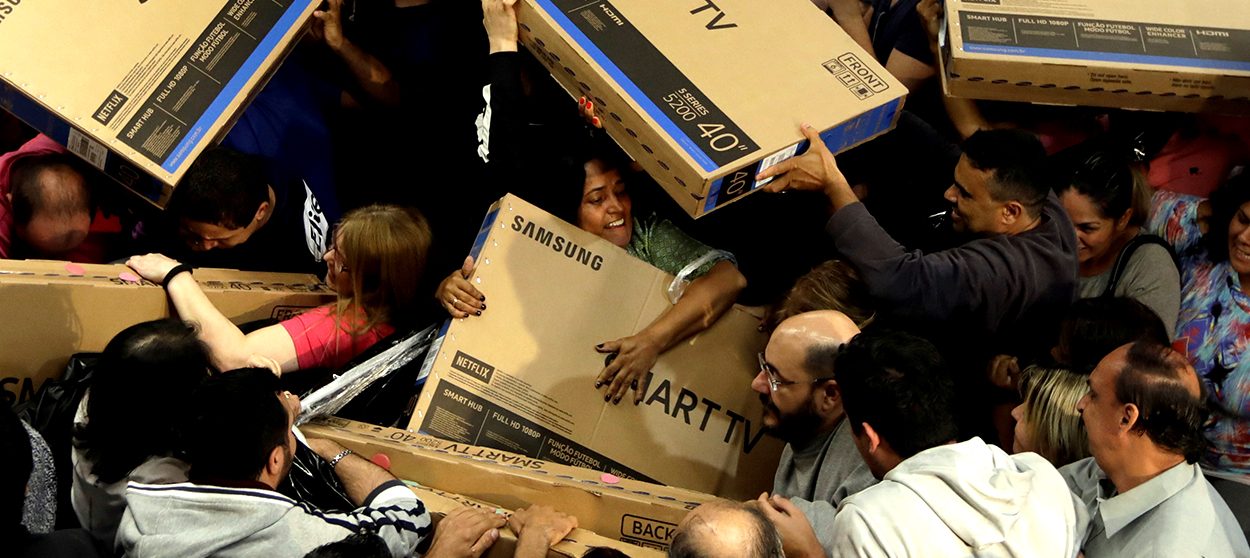Black Friday is the real war on Christmas
This is a story about the ruin of American consumerism


A free daily email with the biggest news stories of the day – and the best features from TheWeek.com
You are now subscribed
Your newsletter sign-up was successful
There is no "war on Christmas" — at least, not the way you've heard.
Christmas is not and cannot be ruined by store clerks saying "Happy Holidays" or Starbucks using plain red cups. Christmas is not canceled because there's no nativity scene on city property or public schools let kids out for "winter break."
If you believe, as I do, that Christmas is a celebration of God becoming human to rescue the whole world, then none of these trappings can affect that reality in the least. Christmas is every bit as true and significant when marked by a silent thought as when celebrated with the full glories of eggnog and parties and the soaring notes of Handel's Messiah. Nothing anyone can say or do can make Christmas less.
The Week
Escape your echo chamber. Get the facts behind the news, plus analysis from multiple perspectives.

Sign up for The Week's Free Newsletters
From our morning news briefing to a weekly Good News Newsletter, get the best of The Week delivered directly to your inbox.
From our morning news briefing to a weekly Good News Newsletter, get the best of The Week delivered directly to your inbox.
Insofar as there is a risk to Christmas, the call is coming from inside the house. It is what C.S. Lewis dubbed the "commercial racket" surrounding this holy day, the endless nuisance of consumerism that engulfs us in a choking wave of waste and social panic that here in America begins — if we're lucky — with the last bite of Thanksgiving turkey.
"Things are given as presents which no mortal ever bought for himself," Lewis complained in 1957, "gaudy and useless gadgets, 'novelties' because no one was ever fool enough to make their like before. Have we really no better use for materials and for human skill and time than to spend them on all this rubbish?" (It is a mercy he died before witnessing the modern American superstore.)
The peak of this inanity, of course, is Black Friday.
It is commonplace among people of a certain economic class to take a dim view of Black Friday. Having been on both sides of that class line, I readily concede it is easier to denounce the day if it does not stand as your one chance to afford some appliance or electronic that would otherwise be out of reach.
A free daily email with the biggest news stories of the day – and the best features from TheWeek.com
But my objection is not to sales. I'm all for sales. No, my objection is to sales for Christmas — sales because Christmas has been co-opted to become our country's high holiday of conspicuous (and often debt-funded) consumption of things we objectively do not need. It is one thing to wisely wait until Black Friday to buy a new washing machine or television; it is another hit the mall at some ungodly hour with a Christmas shopping list the size of a CVS receipt.
A great merit of nearly ubiquitous internet access is that it has allowed us to use the advantageous part of Black Friday (discounts on useful items we know in advance we need to purchase) while discarding the rest (abruptly ending Thanksgiving festivities to browse products no one should ever own and then buying too many of them to prove to ourselves there was a point to all this).
Instead of engaging in this consumerist war on Christmas, have a frank conversation about gifts with family and friends. This may feel awkward, but agreeing not to buy stuff for buying's sake is incredibly freeing. If gifts aren't in the budget, you can say so! If you can't think of anything to buy someone, you don't have to buy them anything! It's rude not to reciprocate gifts if that expectation has been established, but you can change the expectation.
A scheme like the four-gift rule — "something you want, something you need, something to wear, and something to read" — is a good way to go. People may be more receptive to this conversation than you think, because they probably find the holiday shopping season just as expensive, exhausting, and distracting as you do.
Instead of giving needless gifts, show family and friends love at Christmas by giving them your time. Have dinner together. Help them move a couch. Go to church on Christmas Eve. Do anything but toss each other by mutual disconsent into the joyless press of holiday consumption.
Bonnie Kristian was a deputy editor and acting editor-in-chief of TheWeek.com. She is a columnist at Christianity Today and author of Untrustworthy: The Knowledge Crisis Breaking Our Brains, Polluting Our Politics, and Corrupting Christian Community (forthcoming 2022) and A Flexible Faith: Rethinking What It Means to Follow Jesus Today (2018). Her writing has also appeared at Time Magazine, CNN, USA Today, Newsweek, the Los Angeles Times, and The American Conservative, among other outlets.
-
 Political cartoons for February 15
Political cartoons for February 15Cartoons Sunday's political cartoons include political ventriloquism, Europe in the middle, and more
-
 The broken water companies failing England and Wales
The broken water companies failing England and WalesExplainer With rising bills, deteriorating river health and a lack of investment, regulators face an uphill battle to stabilise the industry
-
 A thrilling foodie city in northern Japan
A thrilling foodie city in northern JapanThe Week Recommends The food scene here is ‘unspoilt’ and ‘fun’
